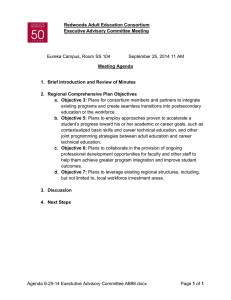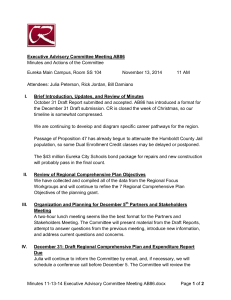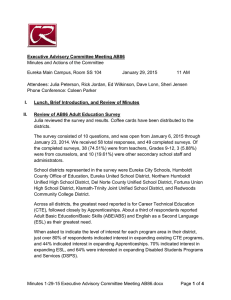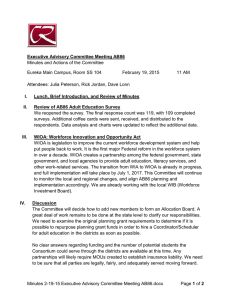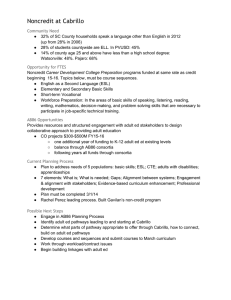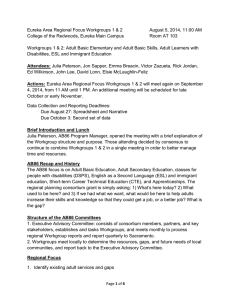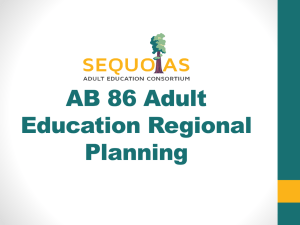Eureka Campus, Room AT103/104 December 5, 2014 11 A.M.
advertisement
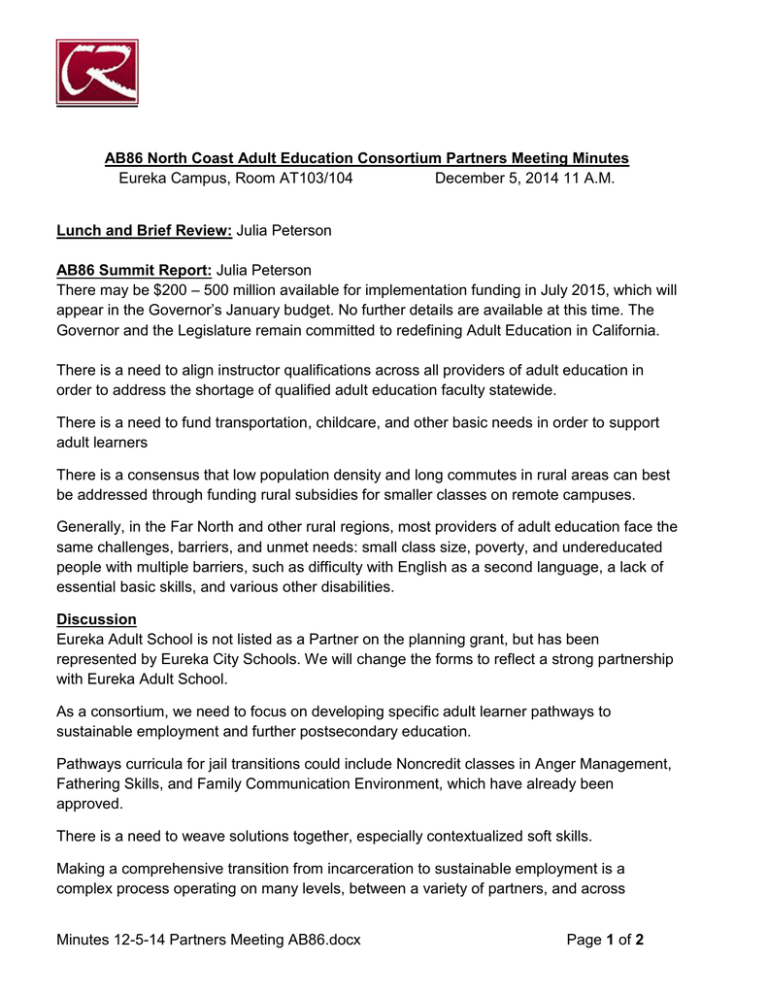
AB86 North Coast Adult Education Consortium Partners Meeting Minutes Eureka Campus, Room AT103/104 December 5, 2014 11 A.M. Lunch and Brief Review: Julia Peterson AB86 Summit Report: Julia Peterson There may be $200 – 500 million available for implementation funding in July 2015, which will appear in the Governor’s January budget. No further details are available at this time. The Governor and the Legislature remain committed to redefining Adult Education in California. There is a need to align instructor qualifications across all providers of adult education in order to address the shortage of qualified adult education faculty statewide. There is a need to fund transportation, childcare, and other basic needs in order to support adult learners There is a consensus that low population density and long commutes in rural areas can best be addressed through funding rural subsidies for smaller classes on remote campuses. Generally, in the Far North and other rural regions, most providers of adult education face the same challenges, barriers, and unmet needs: small class size, poverty, and undereducated people with multiple barriers, such as difficulty with English as a second language, a lack of essential basic skills, and various other disabilities. Discussion Eureka Adult School is not listed as a Partner on the planning grant, but has been represented by Eureka City Schools. We will change the forms to reflect a strong partnership with Eureka Adult School. As a consortium, we need to focus on developing specific adult learner pathways to sustainable employment and further postsecondary education. Pathways curricula for jail transitions could include Noncredit classes in Anger Management, Fathering Skills, and Family Communication Environment, which have already been approved. There is a need to weave solutions together, especially contextualized soft skills. Making a comprehensive transition from incarceration to sustainable employment is a complex process operating on many levels, between a variety of partners, and across Minutes 12-5-14 Partners Meeting AB86.docx Page 1 of 2 substantial barriers to success. Moral Reconation Therapy and cognitive-behavioral interventions have proven valuable in helping former offenders identify their barriers to success, and to begin to develop personal motivation and imagine a sustainable future outside of the system. One possibility for supporting change is the creation of learning communities, or cohorts, in shared transitional housing, such as the dorms at CR or other shared housing. Qualified offenders could be released, under supervision, directly to the campus in order begin or continue their educational and career development with others making the same types of transition. Additionally, living on campus would solve access issues such as transportation and available technology. Probation stipulations and enforcement can be applied to these transitions, creating the need for qualified case managers to “walk” offenders through their transition back into the community. Creative application of the Response to Intervention model used widely in K-12 programs may offer some benefit in identifying and tracking offender strengths and outcomes. Response to Intervention integrates assessment and intervention within a multi‐level prevention system to maximize achievement and reduce problems. Approximately one-third of the Humboldt County Jail population is permanently or temporarily disabled, so CR Noncredit DSPS classes, in partnership with county mental health services, can play a substantial role in supporting former offender transitions. Another area to explore is contextualized ESL instruction for industry, such as farm and ranch work. So far, it has been difficult to interest employers in on-site instruction, and currently many workers take their ESL in the evenings. Integrating soft skills into every aspect of employment training is deemed to be essential, and there is an identified need to teach stand-alone classes around common soft skills, such as interpersonal communication and working productively with others in groups. Next Steps December 18th Executive Advisory Committee Meeting December 31st Draft Regional Comprehensive Plan and Expenditure Report Due Minutes 12-5-14 Partners Meeting AB86.docx Page 2 of 2
